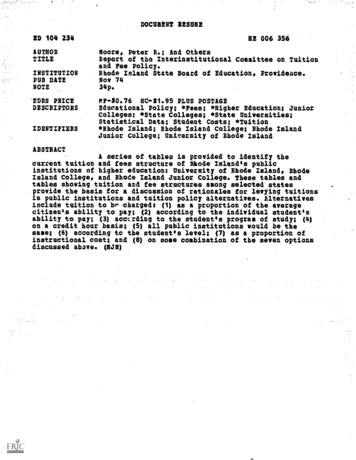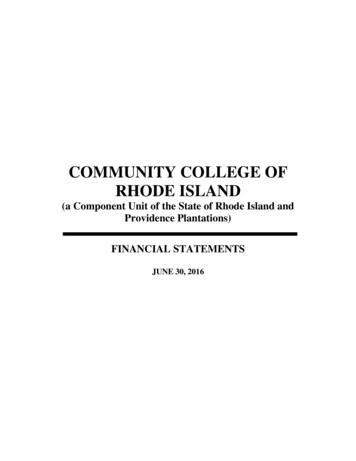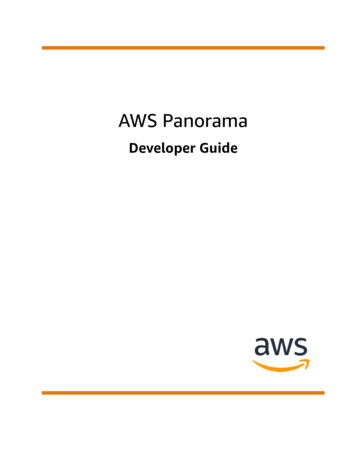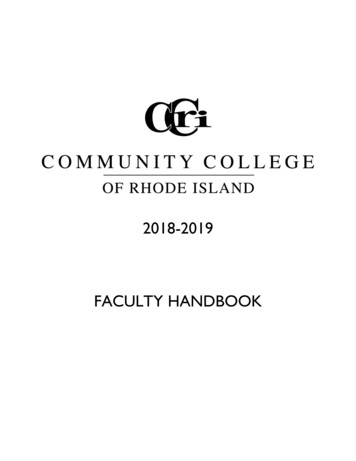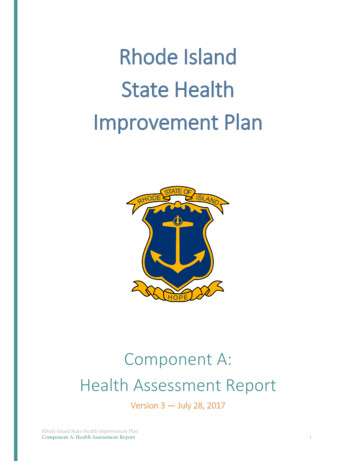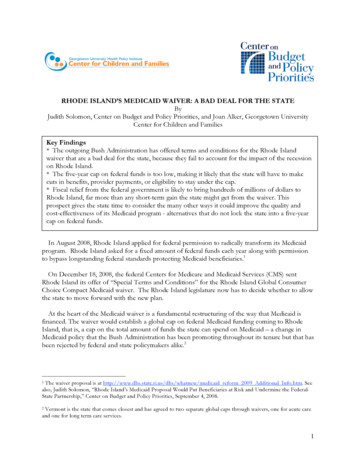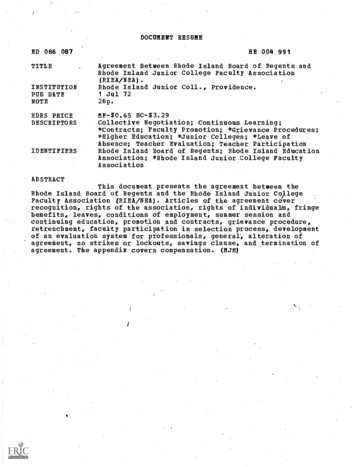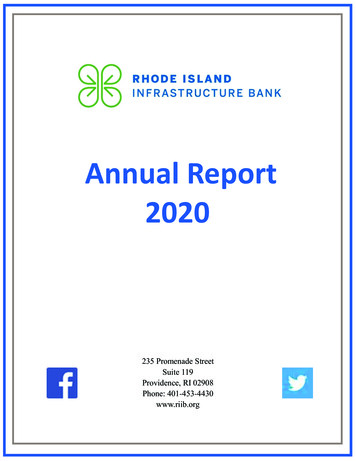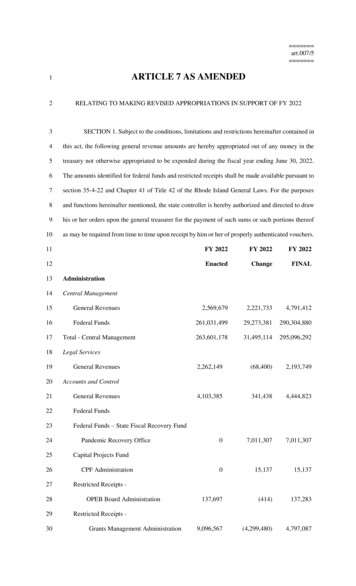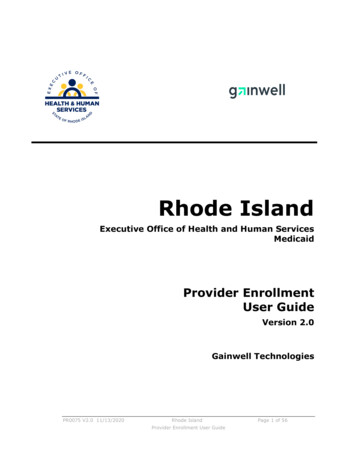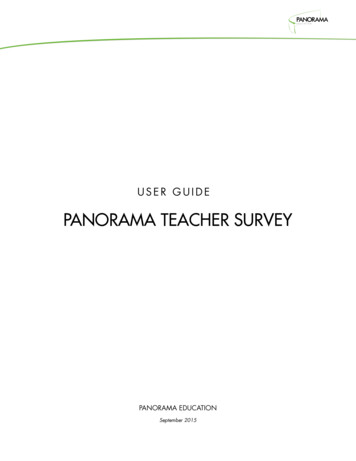
Transcription
USER GUIDEPANORAMA TEACHER SURVEYPANORAMA EDUCATIONSeptember 2015
ABOUT THE SURVEYOverviewIn the spring of 2015, Panorama Education launched the Panorama Teacher Survey to give principals and schooland district leaders a tool to collect feedback from teachers. he survey is designed to spark and supportproductive conversations between teachers and school leaders about professional learning, school communication,school climate, and other key topics. In the fall of 2015, Panorama launched a Staff Survey version of thePanorama Teacher Survey that is designed to be administered to non-instructional school staff who still havestudent-facing roles (including but not limited to librarians, guidance counselors, administrators, and nurses).Developed by Dr. Hunter Gehlbach and the Panorama research team, the Panorama Teacher Survey andPanorama Staff Survey are grounded in the most advanced survey methodology and practice, and are available asfree resources for educators around the world. We have designed the surveys as a set of scales, or questions relatedto a single topic, so that educators may customize the surveys by selecting the topics they wish to use in theirschool without compromising the integrity of the surveys. We have rigorously developed these surveys, andPanorama is committed to validating, testing, and reining them over time. We hope you ind these tools valuablefor your school, district, or network.If you have any questions or suggestions, please do not hesitate to contact us at research@panoramaed.com.Who Should Use the Survey?he Panorama Teacher Survey and Panorama Staff Survey gather feedback from faculty and staff about theirperceptions of their professional learning opportunities, their conidence in the classroom, their relationshipswith colleagues, students’ families, and the school leadership, and their feelings about the school’s climate. hesurveys are intended to be used by school, district, and network administrators who want to gather faculty andstaff perception data and engage their faculty and staff in meaningful discourse about school improvement.Survey Developmenthe survey was developed under the leadership of Dr. Hunter Gehlbach, Associate Professor at the GevirtzGraduate School of Education at UC Santa Barbara and Director of Research at Panorama Education. Dr.Gehlbach is a leading survey methodologist and education researcher and a former high school social studiesteacher.2
he Panorama Teacher Survey and the Panorama Staff Survey look different than many school surveys becauseDr. Gehlbach and his team developed the instrument in line with today’s best practices for survey design. hesemajor differences include: Wording survey items as questions rather than statements Eliminating “agree-disagree” response options and instead reinforcing the underlying topic in responseoptions Asking about one idea at a time rather than using double-barreled items (e.g., “How happy andengaged are you?”) Using at least ive response options Making sure that all response options are verbally-labeledEach of these differences substantially minimizes measurement error. For an explanation of more of the surveydesign best practices that went into the making of the Panorama Teacher Survey and Panorama Staff Survey,please visit www.panoramaed.com/checklist.Validation Process“Validating” surveys is an ongoing process, which means that there is no such thing as a fully “validated” survey.Rather, as more studies and pilot tests are conducted, the data provide more clarity regarding whether the surveyscales measure what they are supposed to for different purposes and populations.Currently, we are gathering data on the Panorama Teacher Survey and Panorama Staff Survey to accumulateevidence that the questions, scales, and instruments are reliable and valid — accurately measuring the conceptswe hope to measure.As we continue to gather more data from schools around the country and the world, we are committed tomaking improvements to the Panorama Teacher Survey and Panorama Staff Survey so that they can be used withconidence by school leaders working in many educational settings and contexts to gather feedback from theirfaculty and staff.Using the SurveyTo meet the unique needs of your speciic context, we encourage you to customize the survey by selecting thescales that you feel matter most to your community. he Panorama Teacher Survey was created to collectfeedback only from instructional staff, while the Panorama Staff Survey is designed to collect feedback from allstaff, instructional and non-. School and district leaders may choose to administer either or both versions of thescales, depending on the kind of feedback they would like to collect.3
Scales are marked as being “Teacher” scales (from the Panorama Teacher Survey) or “Staff ” scales (from thePanorama Staff Survey). A small number of scales are speciic to instructional staff, and are only included on thePanorama Teacher survey.Before administering the survey, we suggest school leaders have a conversation with faculty and staff about thevalue of this survey as a way for them to communicate directly with leadership about their experiences in theschool. Some educators have achieved high response rates from their faculty and staff by telling them that thesurvey is like a progress report: it is an opportunity to give feedback about the school climate, school leadershipand how to improve.We believe that all educators deserve the best tools available, which means that we are committed to keeping thePanorama Teacher Survey and Panorama Staff Survey free and open-source. he surveys are “free” in that weinvite educators everywhere to use them at no cost. We only ask that you identify them as the “Panorama TeacherSurvey” or “Panorama Staff Survey” so that others may ind it as well. We hope that you will share your feedbackwith our research team (research@panoramaed.com) so we can consider it in future versions of the surveys.About Panorama EducationPanorama Education partners with schools, districts and state departments of education to design andimplement survey programs for students, parents, and teachers. Panorama offers a technology platform tosupport survey administration and create reports that are clear, actionable, and, most importantly, help teachersand administrators improve their schools. Panorama’s client services team helps districts and states implementsurvey programs in line with best practices. Panorama currently runs survey programs in over 6,500 schools in 35states, including those in the Tulsa Public Schools, the Connecticut State Department of Education, and Teachfor America.www.panoramaed.comresearch@panoramaed.com4
WHAT IT MEASURESSchool Climate - Teacher and Staff p. 8-9Perceptions of the overall social and learning climate of the school.Example Question: How often do you see students helping each other without being prompted?Professional Learning - Teacher and Staff p. 10-11Perceptions of the amount and quality of professional growth and learning opportunities available to schoolfaculty and staff.Example Question: How often do your professional development opportunities help you explore new ideas?Teaching Efficacy - Teacher p. 12Faculty perceptions of their professional strengths and areas for growth.Example Question: How conident are you that you can engage students who typically are not motivated?Feedback and Coaching - Teacher and Staff p. 13-14Perceptions of the amount and quality of feedback faculty and staff receive.Example Question: How useful do you ind the feedback you receive on your teaching?Staff-Leadership Relationships - Teacher and Staff p. 15Perceptions of faculty and staff relationships with school leaders.Example Question: When you face challenges at work, how supportive are your school leaders?Educating All Students - Teacher p. 16Faculty perceptions of their readiness to address issues of diversity.Example Question: When sensitive issues of diversity arise in class, how easily can you think of strategies to handle thesituation?School Leadership - Teacher and Staff p. 17-18Perceptions of the school leadership’s effectiveness.Example Question: How knowledgeable are your school leaders about what is going on in teachers’ classrooms?5
Testing - Teacher p. 19Perceptions of the impact of testing on teaching and student learning.Example Question: How much pressure do you feel to cover a certain amount of content by a particular point in theyear?Faculty Growth Mindset - Teacher p. 20Perceptions of whether teaching can improve over time.Example Question: How much can teachers improve their classroom management approaches?Staff-Family Relationships - Teacher and Staff p. 21Perceptions of faculty and staff relationships with the families at their school.Example Question: When you face challenges with particular students, how supportive are the families?Evaluation - Teacher and Staff p. 23-24Perceptions of the system that is used to evaluate faculty and staff.Example Question: How accurate is your school's evaluation system at recognizing good teachers?Student Mindset - Teacher p. 25Perceptions of whether students have the potential to change those factors that are central to theirperformance in class.Example Question: How possible do you think it is for your students to change how much effort they put forth?Resources - Teacher and Staff p. 26-27Perceptions of the adequacy of the school’s resources.Example Question: How urgently does your school's technology need to be updated?Grit - Teacher p. 28Perceptions of how well students are able to persevere through setbacks to achieve important long-term goals.Example Question: If your students have a problem while working towards an important goal, how well can theykeep working?6
Roles and Responsibilities - Teacher and Staff p. 29Perceptions of who should be primarily responsible for school success.Example Question: Who is primarily responsible for ensuring good communication between home and school?Free Responses - Teacher and Staff p. 30Open-ended questions about a variety of topics that may be of interest to many schools.Example Question: If you could change anything about working at your school, what would you change?Future Plans - Teacher and Staff p. 30Questions about faculty and staff aspirations for the future.Example Question: What are your career aspirations?Background Questions - Teacher and Staff p. 30Demographic questions about survey-takers that could be included in the survey and may be of interest tomany schools.Example Question: For how many years have you taught at your current school?Dr. Hunter Gehlbach is the Director of Research at Panorama Education and an AssociateProfessor of Education at UC Santa Barbara’s Gevirtz Graduate School of Education. He isan educational psychologist with an academic focus in helping social scientists and practitionersdesign better surveys and questionnaires. He is particularly interested in helping schools thinkabout ways to use surveys to improve teacher and student outcomes, and teaches classes in each of these areas atUC Santa Barbara. After graduating with a B.A. from Swarthmore College in psychology and education, Dr.Gehlbach taught high school social studies before returning to school for a M.Ed. in school counseling from theUniversity of Massachusetts-Amherst and a Ph.D. in educational psychology from Stanford.7
School Climate - TeacherPerceptions of the overall social and learning climate of the school.ItemOn most days, how enthusiastic are the studentsabout being at school?Response AnchorsNot at asticQuite enthusiasticExtremelyenthusiasticTrusted a little bit Trusted somewhat Trusted quite a bitTrusted atremendousamountTo what extent are teachers trusted to teach inthe way they think is best?Not at all trustedHow positive are the attitudes of yourcolleagues?Not at all positiveSlightly positiveSomewhat positiveQuite positiveExtremely positiveHow supportive are students in theirinteractions with each other?Not at allsupportiveSlightly supportiveSomewhatsupportiveQuite supportiveExtremelysupportiveHow respectful are the relationships betweenteachers and students?Not at allrespectfulSlightly respectfulSomewhatrespectfulQuite respectfulExtremelyrespectfulHow optimistic are you that your school willimprove in the future?Not at alloptimisticSlightly optimisticSomewhatoptimisticQuite optimisticExtremelyoptimisticHow often do you see students helping eachother without being prompted?Almost neverOnce in a whileSometimesFrequentlyAlmost all thetimeNot at allsupportiveSlightly supportiveSomewhatsupportiveQuite supportiveExtremelysupportiveNot at all positiveSlightly positiveSomewhat positiveQuite positiveExtremely positiveWhen new initiatives to improve teaching arepresented at your school, how supportive areyour colleagues?Overall, how positive is the workingenvironment at your school?8
School Climate - StaffPerceptions of the overall social and learning climate of the school.ItemOn most days, how enthusiastic are the studentsabout being at school?Response AnchorsNot at asticQuite enthusiasticExtremelyenthusiasticTrusted a little bit Trusted somewhat Trusted quite a bitTrusted atremendousamountTo what extent are staff trusted to work in theway they think is best?Not at all trustedHow positive are the attitudes of yourcolleagues?Not at all positiveSlightly positiveSomewhat positiveQuite positiveExtremely positiveHow supportive are students in theirinteractions with each other?Not at allsupportiveSlightly supportiveSomewhatsupportiveQuite supportiveExtremelysupportiveHow respectful are the relationships betweenstaff and students?Not at allrespectfulSlightly respectfulSomewhatrespectfulQuite respectfulExtremelyrespectfulHow optimistic are you that your school willimprove in the future?Not at alloptimisticSlightly optimisticSomewhatoptimisticQuite optimisticExtremelyoptimisticHow often do you see students helping eachother without being prompted?Almost neverOnce in a whileSometimesFrequentlyAlmost all thetimeWhen new initiatives are presented at yourschool, how supportive are your colleagues?Not at allsupportiveSlightly supportiveSomewhatsupportiveQuite supportiveExtremelysupportiveNot at all positiveSlightly positiveSomewhat positiveQuite positiveExtremely positiveOverall, how positive is the workingenvironment at your school?9
Professional Learning - TeacherPerceptions of the amount and quality of professional growth and learning opportunities available to facultyand staff.ItemOverall, how supportive has the school been ofyour growth as a teacher?Response AnchorsNot at allsupportiveSlightly supportiveSomewhatsupportiveQuite supportiveExtremelysupportiveAt your school, how valuable are the availableprofessional development opportunities?Not at all valuableSlightly valuableSomewhatvaluableQuite valuableExtremelyvaluableHow helpful are your colleagues' ideas forimproving your teaching?Not at all helpfulSlightly helpfulSomewhat helpfulQuite helpfulExtremely helpfulAlmost neverOnce in a whileSometimesFrequentlyAlmost all thetimeHow relevant have your professionaldevelopment opportunities been to the contentthat you teach?Not at all relevantSlightly relevantSomewhatrelevantQuite relevantExtremely relevanthrough working at your school, how many newteaching strategies have you learned?Almost nostrategiesA few strategiesSome strategiesMany strategiesA great number ofstrategiesSome inputQuite a bit ofinputA tremendousamount of inputLearn someLearn quite a bitLearn atremendousamountHow often do your professional developmentopportunities help you explore new ideas?How much input do you have intoindividualizing your own professionaldevelopment opportunities?Overall, how much do you learn about teachingfrom the leaders at your school?Almost no input A little bit of inputLearn almostnothingLearn a little bit10
Professional Learning - StaffPerceptions of the amount and quality of professional growth and learning opportunities available to facultyand staff.ItemOverall, how supportive has the school been ofyour professional growth?Response AnchorsNot at allsupportiveSlightly supportiveSomewhatsupportiveQuite supportiveExtremelysupportiveAt your school, how valuable are the availableprofessional development opportunities?Not at all valuableSlightly valuableSomewhatvaluableQuite valuableExtremely valuableHow helpful are your colleagues' ideas forimproving your work?Not at all helpfulSlightly helpfulSomewhat helpfulQuite helpfulExtremely helpfulAlmost neverOnce in a whileSometimesFrequentlyAlmost all thetimeNot at all relevantSlightly relevantSomewhatrelevantQuite relevantExtremely relevantAlmost nostrategiesA few strategiesSome strategiesMany strategiesA great number ofstrategiesSome inputQuite a bit ofinputA tremendousamount of inputLearn someLearn quite a bitLearn atremendousamountHow often do your professional developmentopportunities help you explore new ideas?How relevant have your professionaldevelopment opportunities been to your work?hrough working at your school, how many newstrategies for your job have you learned?How much input do you have intoindividualizing your own professionaldevelopment opportunities?Overall, how much do you learn from theleaders at your school?Almost no input A little bit of inputLearn almostnothingLearn a little bit11
Teaching Efficacy - TeacherFaculty perceptions of their professional strengths and areas for growth.ItemResponse AnchorsHow conident are you that you can help yourschool's most challenging students to learn?Not at allconidentSlightly conidentSomewhatconidentQuite conidentExtremelyconidentHow thoroughly do you feel that you know allthe content you need to teach?Not thoroughly atallSlightlythoroughlySomewhatthoroughlyQuite thoroughlyExtremelythoroughlyHow conident are you that you can movethrough material at a pace that works well foreach of your students?Not at allconidentSlightly conidentSomewhatconidentQuite conidentExtremelyconidentWhen one of your teaching strategies fails towork for a group of students, how easily can youthink of another approach to try?Not at all easilySlightly easilySomewhat easilyQuite easilyExtremely easilyIf a parent were upset about something in yourclass, how conident are you that you could havea productive conversation with this parent?Not at allconidentSlightly conidentSomewhatconidentQuite conidentExtremelyconidentHow effective do you think you are at managingparticularly disruptive classes?Not at all effectiveSlightly effectiveSomewhateffectiveQuite effectiveExtremelyeffectiveNot at allconidentSlightly conidentSomewhatconidentQuite conidentExtremelyconidentNot at all clearlySlightly clearlySomewhat clearlyQuite clearlyExtremely clearlyNot at allconidentSlightly conidentSomewhatconidentQuite conidentExtremelyconidentHow conident are you that you can engagestudents who typically are not motivated?How clearly can you explain the mostcomplicated content to your students?How conident are you that you can meet thelearning needs of your most advanced students?12
Feedback and Coaching - TeacherPerceptions of the amount and quality of feedback faculty and staff receive.ItemResponse AnchorsHow much feedback do you receive on yourteaching?No feedbackat allA little bit offeedbackSome feedbackQuite a bit offeedbackA tremendousamount offeedbackHow much do you learn from the teacherevaluation processes at your school?Learn almostnothingLearn a little bitLearn someLearn quite a bitLearn atremendousamountHow useful do you ind the feedback you receiveon your teaching?Not at all usefulSlightly usefulSomewhat usefulQuite usefulExtremely usefulAt your school, how thorough is the feedbackyou receive in covering all aspects of your role asa teacher?Not at allthoroughSlightly thoroughSomewhatthoroughQuite thoroughExtremelythoroughAlmost neverOnce in a whileSometimesFrequentlyAlmost alwaysHow often do you receive feedback on yourteaching?13
Feedback and Coaching - StaffPerceptions of the amount and quality of feedback faculty and staff receive.ItemResponse AnchorsHow much feedback do you receive on yourwork?No feedbackat allA little bit offeedbackSome feedbackQuite a bit offeedbackA tremendousamount offeedbackHow much do you learn from the evaluationprocesses at your school?Learn almostnothingLearn a little bitLearn someLearn quite a bitLearn atremendousamountNot at all usefulSlightly usefulSomewhat usefulQuite usefulExtremely usefulNot at allthoroughSlightly thoroughSomewhatthoroughQuite thoroughExtremelythoroughAlmost neverOnce in a whileSometimesFrequentlyAlmost alwaysHow useful do you ind the feedback you receiveon your work?At your school, how thorough is the feedbackyou receive in covering all aspects of your role?How often do you receive feedback on yourwork?14
Staff-Leadership Relationships - Teacher and StaffPerceptions of faculty and staff relationships with school leaders.ItemResponse AnchorsHow friendly are your school leaders towardyou?Not at all friendlySlightly friendlySomewhatfriendlyQuite friendlyExtremely friendlyAt your school, how motivating do you indworking with the leadership team?Not at uite motivatingExtremelymotivatingHow much trust exists between school leadersand staff ?Almost no trustA little bit of trustSome trustQuite a bitof trustA tremendousamount of trustHow much do your school leaders care aboutyou as an individual?Do not care at allCare a little bitCare somewhatCare quite a bitCare a tremendousamountHow conident are you that your school leadershave the best interests of the school in mind?Not at allconidentSlightly conidentSomewhatconidentQuite conidentExtremelyconidentHow fairly does the school leadership treat thestaff ?Not fairly at allSlightly fairlySomewhat fairlyQuite fairlyExtremely fairlyWhen you face challenges at work, howsupportive are your school leaders?Not at allsupportiveSlightly supportiveSomewhatsupportiveQuite supportiveExtremelysupportiveHow respectful are your school leaders towardsyou?Not at allrespectfulSlightly respectfulSomewhatrespectfulQuite respectfulExtremelyrespectfulNot at en challenges arise in your personal life, howunderstanding are your school leaders?15
Educating All Students - TeacherFaculty perceptions of their readiness to address issues of diversity.ItemResponse AnchorsHow easy do you ind interacting with studentsat your school who are from a different culturalbackground than your own?Not at all easySlightly easySomewhat easyQuite easyExtremely easyHow comfortable would you be incorporatingnew material about people from differentbackgrounds into your curriculum?Not at leQuite comfortableExtremelycomfortableNotknowledgeableat knowledgeableExtremelyknowledgeableNot at leQuite comfortableExtremelycomfortableNot at all easySlightly easySomewhat easyQuite easyExtremely easyNot at leQuite comfortableExtremelycomfortableHow easily do you think you could make aparticularly overweight student feel like a partof class?Not at all easilySlightly easilySomewhat easilyQuite easilyExtremely easilyHow comfortable would you be having astudent who could not communicate well withanyone in class because his/her home languagewas unique?Not at leQuite comfortableExtremelycomfortableWhen a sensitive issue of diversity arises inclass, how easily can you think of strategies toaddress the situation?Not at all easilySlightly easilySomewhat easilyQuite easilyExtremely easilyHow knowledgeable are you regarding where toind resources for working with students whohave unique learning needs?If students from different backgroundsstruggled to get along in your class, howcomfortable would you be intervening?How easy would it be for you to teach a classwith groups of students from very differentreligions from each other?In response to events that might be occurring inthe world, how comfortable would you behaving conversations about race with yourstudents?16
School Leadership - TeacherPerceptions of the school leadership’s effectiveness.ItemResponse AnchorsHow clearly do your school leaders identifytheir goals for teachers?Not at all clearlySlightly clearlySomewhat clearlyQuite clearlyExtremely clearlyHow positive is the tone that school leaders setfor the culture of the school?Not at all positiveSlightly positiveSomewhat positiveQuite positiveExtremely positiveHow effectively do school leaders communicateimportant information to teachers?Not at alleffectivelySlightly effectivelySomewhateffectivelyQuite effectivelyExtremelyeffectivelyHow knowledgeable are your school leadersabout what is going on in teachers’ classrooms?Notknowledgeable teknowledgeableExtremelyknowledgeableHow responsive are school leaders to yourfeedback?Not at allresponsiveSlightly responsiveSomewhatresponsiveQuite responsiveExtremelyresponsiveFor your school leaders, how important isteacher satisfaction?Not important atallSlightly importantSomewhatimportantQuite importantExtremelyimportantWhen the school makes important decisions,how much input do teachers have?Almost no input A little bit of inputSome inputQuite a bit ofinputA tremendousamount of inputHow effective are the school leaders atdeveloping rules for students that facilitate theirlearning?Not at all effectiveSlightly effectiveSomewhateffectiveQuite effectiveExtremelyeffectiveOverall, how positive is the inluence of theschool leaders on the quality of your teaching?Not at all positiveSlightly positiveSomewhat positiveQuite positiveExtremely positive17
School Leadership - StaffPerceptions of the school leadership’s effectiveness.ItemResponse AnchorsHow clearly do your school leaders identifytheir goals for the staff ?Not at all clearlySlightly clearlySomewhat clearlyQuite clearlyExtremely clearlyHow positive is the tone that school leaders setfor the culture of the school?Not at all positiveSlightly positiveSomewhat positiveQuite positiveExtremely positiveHow effectively do school leaders communicateimportant information to staff ?Not at alleffectivelySlightly effectivelySomewhateffectivelyQuite effectivelyExtremelyeffectivelyNotknowledgeable teknowledgeableExtremelyknowledgeableNot at allresponsiveSlightly responsiveSomewhatresponsiveQuite responsiveExtremelyresponsiveFor your school leaders, how important is staffsatisfaction?Not important atallSlightly importantSomewhatimportantQuite importantExtremelyimportantWhen the school makes important decisions,how much input do staff have?Almost no input A little bit of inputSome inputQuite a bit ofinputA tremendousamount of inputHow knowledgeable are your school leadersabout what is going on in the school?How responsive are school leaders to yourfeedback?How effective are the school leaders atdeveloping rules for students that facilitate theirlearning?Not at all effectiveSlightly effectiveSomewhateffectiveQuite effectiveExtremelyeffectiveOverall, how positive is the inluence of theschool leaders on the quality of your work?Not at all positiveSlightly positiveSomewhat positiveQuite positiveExtremely positive18
Testing - TeacherPerceptions of the impact of testing on teaching and student learning.ItemResponse AnchorsHow much pressure from school leaders do youfeel to have your students achieve certain testingresults?Almost nopressureA little bit ofpressureSome pressureQuite a bit ofpressureA tremendousamount ofpressureAt your school, how often are you encouraged toteach test-taking strategies?Almost neverOnce in a whileSometimesFrequentlyAlmost all thetimeHow much pressure do you feel to coverparticular content in your teaching?Almost nopressureA little bit ofpressureSome pressureQuite a bit ofpressureA tremendousamount ofpressureHow many of your teaching decisions are madewith the goal of trying to improve students' testscores?Almost nodecisionsA few decisionsSome decisionsMany decisionsAlmost alldecisionsAlmost neverOnce in a whileSometimesFrequentlyAlmost all thetimeAlmost nopressureA little bit ofpressureSome pressureQuite a bit ofpressureA tremendousamount ofpressureHow often do you teach topics you think areunimportant because of pressure aroundstandardized tests?How much pressure do you feel to cover acertain amount of content by a particular pointin the year?19
Faculty Growth Mindset - TeacherPerceptions of whether teaching can improve over time.ItemResponse AnchorsTo what extent can teachers increase how muchtheir most difficult students learn from them?Cannot increaseat allCan increase alittleCan increasesomewhatCan increase quitea bitCan increase atremendousamountHow easily can teachers change their teachingstyle to match the needs of a particular class?Not at all easilySlightly easilySomewhat easilyQuite easilyExtremely easilyTo what extent can teachers improve theirimplementation of different teaching strategies?Cannot improveat allCan improve alittleCan improvesomewhatCan improve quitea bitCan improve atremendousamountQuite possible tochangeCompletelypossible to changeHow possible is it for teachers to change theirability to work with dissatisied parents?Not at all possible A little possible toSomewhatto changechangepossible to changeHow much can teachers improve theirclassroom management approaches?Cannot improveat allCan improveslightlyCan improvesomewhatCan improve quitea bitCan improve atremendousamountTo what extent can teachers change theirintelligence about the subjects that they teach?Cannot changeat allCan change a littlebitCan changesomewhatCan change quitea bitCan change atremendousamountOver the
Panorama Teacher Survey that is designed to be administered to non-instructional school staff who still have student-facing roles (including but not limited to librarians, guidance counselors, administrators, and nurses). Developed by Dr. Hunter Gehlbach and the Panorama research team, the Panorama Teacher Survey and
